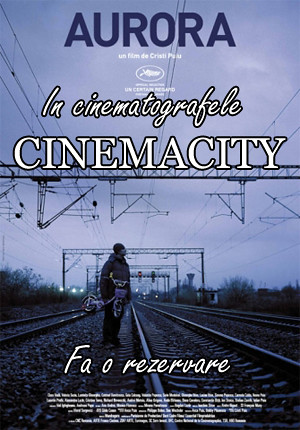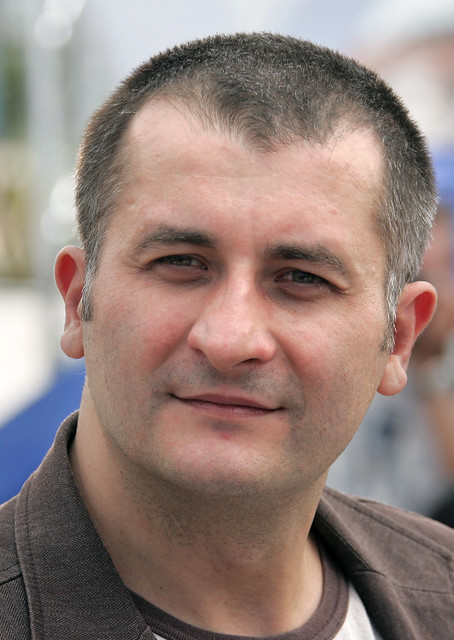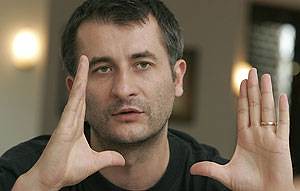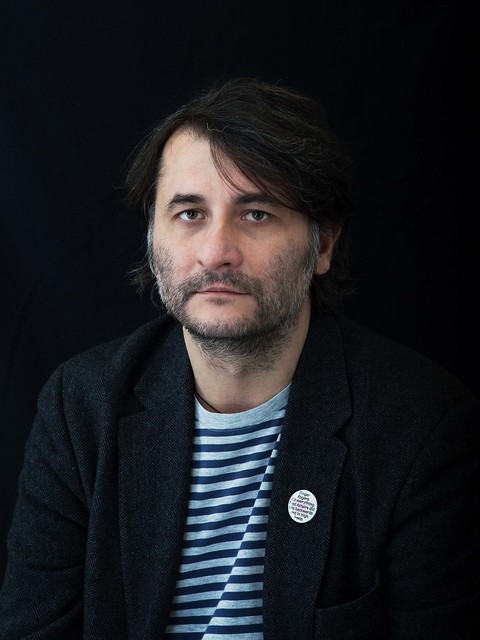poster-oficial-aurora-cristi-puiu_04_03_2011 copy, a photo by Cineblog on Flickr.
from Film Quarterly Winter 2010, Vol. 64, No. 2
by Rob White
Aurora, the outstanding new film by the director of The Death of Mr. Lazarescu, begins as the lead character, Viorel, wakes up before dawn in an apartment in Bucharest, Romania. Played brilliantly by Cristi Puiu himself, Viorel has a quiet intensity that is immediately troubling. When he and the woman he was sleeping with, Gina, have breakfast, the way he looks at her is frighteningly cold. His monotonous speech compounds the impression of menace. Gina explains that her daughter made an ingenuous remark at school about the Little Red Riding Hood fairytale: “The wolf eats granny. Then he puts on her clothes. So when the hunter cuts her out of the wolf, she should be naked.” It is an apposite way to start: the domestic conversation is mundane, but violence lurks in it.
The nature of the domesticity, though, is somewhat mysterious. Later Viorel comes back to this residence and the door is answered by a man who appears to be Gina’s husband. Viorel has to wait outside until she emerges to give him a strip of unidentified pills. On the basis of the opening scene, it could easily have been assumed that Viorel and Gina are married; on the basis of the later one, it seems she is his drug dealer. (In due course it emerges that Viorel is divorced.) Throughout Aurora, background detail is purposefully withheld. In an unnerving scene, Viorel bullies the staff of a boutique in his search for someone called Andreea, but it is never spelled out who she is. When I first watched Aurora, I gradually entered a state of sustained anxiety. After a second viewing, I realized that my distress was in part a result of the way Puiu pares down his fiction, rationing the story information.
Sometimes a character in Aurora will wander out of a room, leaving the fixed camera to frame a peripheral space. What the audience sees is often obstructed and the violence that occurs is always seen, if it is glimpsed at all, from a distance. The most striking camera movement occurs when Viorel walks up a staircase. The camera follows him until he reaches the next floor and then traces his path from below, along the ceiling. The attack that ensues is only heard. What kind of viewer experience is involved here? In the press book for Aurora‘s screening at Cannes this year, Puiu is quoted as saying, “I told the cameramen to follow the character, and to look at him with a feeling that resembles a father watching his child learn to walk.” It is a curious pronouncement because the restricted viewpoints emphasize the audience’s inability to intervene or even to know what is happening. It would, in my opinion, be better to say that the camera occupies the perspective of a scared child, frozen by the sight of daily life being interrupted by bewildering or atrocious events. There is, however, a further complication: more than once, the camera records Viorel spying (and his targets include his own children). It is not easy therefore to separate the vantage points of horrified witness and furtive stalker, and this is another reason why Aurora is so upsetting.
When Viorel fires his shotgun several times in a suburban home, dogs bark in alarm but no one else seems to notice. This detail suggests the extent to which the world of Aurora is fragmented. In The Death of Mr. Lazarescu, the dying man is progressively stripped of the components of his communal being—home, community, family, speech—as he gets absorbed into the Bucharest hospital system. Through what can be called a technique of dissection, Puiu bares the relationship between a person and social institutions, and between self and state in post-communist Romania. The extent to which Aurora partakes of the same inquiry is harder to judge, if only because Viorel has such contempt for those around him. He already lives on the margins of society, as is made strikingly clear by contrast when he visits a bustling apartment full of chatter and commotion.
I met Cristi Puiu on October 25, during the London Film Festival (October 13–28). I wanted to ask him about the way Aurora inhibits understanding, and the degree to which it is a political film.†
Rob White: Aurora purposely omits background information and so to an unusual degree the audience is denied understanding of how characters relate to one another.
Cristi Puiu: You’re asking me if I have this information? It happens that I have. There are some directors who would play with this question, to create mystery. But for me a film has to be logical. So I have all this information and not only that, but I shot it. I have six hours of film. Remember that I am a storyteller and one of the first lessons of cinema is that it is an art of ellipsis. In this film, I didn’t hide things. I observed and then kept just moments that I thought were revelatory for the story I’m going to tell.
Toward the end of the film Viorel goes to a boutique looking for Andreea. Who is Andreea?
In the film I’m observing somebody for thirty-six hours and so it’s certain that he’s going to meet people that you don’t know, whose identity will be unclear. And in this situation he’s looking for a friend of his ex-wife. He’s in the process of finding “the guilty ones” in the tragic ending of his marriage. But it wouldn’t work to add lines like: “I’m looking for Andreea, my wife’s friend.” It isn’t a traditional film like that.
What about Gina, Viorel’s lover, whom we see in the first scene and who later gives him some pills?
She’s giving him Xanax. It’s important to point out that she’s one of the doctors in The Death of Mr. Lazarescu—it’s the same Gina from that film. And Pusa’s [Viorel's mother] next-door neighbor is the nurse from the ambulance in Lazarescu. It’s not just the same actress. (And I wanted this nurse to have her own Mr. Lazarescu at home—the old man who offers Viorel the drink.) When I started my ongoing project, Six Stories from the Bucharest Outskirts, I wanted to be inside a construction in the manner of Balzac. Or like Truffaut: Stolen Kisses, Love on the Run. And Viorel’s upstairs neighbor, the woman, is another nurse from Lazarescu. I wanted to mix these two films about death (one man receiving death, the other giving death). So Gina’s a general practitioner and maybe Viorel originally went to see her to tell her he’s having problems with his prostate; their relationship has something to do with his hypochondriac tendencies.
Viorel tries to get along with being divorced. For example, he’s trying to renovate his apartment and to start a new life. And as part of that he’s having this affair, which doesn’t really work, even though they might look to the audience like husband and wife. In the script their relationship is explained, but I didn’t want it finally to be so explicit. While writing the script, I was caught somehow in a traditional model of storytelling—like from Aristotle’s Poetics. But I don’t believe in this! I think cinema is more than storytelling and so I had to get rid of some things. The single alternative formula that I could articulate at that moment was: observing life. I had to find a way of telling a fictional story in the fashion of observational documentary. So these moments that are happening in the life of an individual can’t be explicit for a third person, for the spectator. We see things in front of our eyes and we jump to conclusions. We choose to come to the conclusions that we like, the version of events that suits us.
Usually when you’re delivering your story and you’re honest with yourself, your message can’t be clear. You must stay within a perimeter of facts and allow the audience to play the role of the detective. It’s what we do when we’re reading books and watching films. We want to be a step ahead of the story; it’s a natural tendency, like making predictions. If you look at the newspaper, you may have a feeling of living in an era of predictions—everyone is making predictions.
But how can you make it so the camera has no preconceptions or there’s no anticipation in the movement of the camera? We make anticipations all the time. The camera can’t be stupid. It’s not just an artificial recording device. There’s a human being observing. Cinema is an instrument for investigating the real, for investigating life. OK, so there’s another question that arises, which is: why fiction films? It’s because fictions come from our minds. And so they’re like evidence—evidence of a certain way of thinking about the world. The camera isn’t moving accidentally; there’s an intention. So cinema can be a kind of anthropological device for you to look at the world outside yourself and the world inside yourself, inside your head, which fiction films allow you to do.
Like other recent Romanian films, Aurora seems to suggest that there is no comprehensive viewpoint. There is no god’s-eye view, no authoritative party opinion. The film insists on the restriction of perspective. Is this perhaps a humanist response to the loss of any totalizing ideology?
Yes. Another, maybe simpler way to say it is that I assume that it’s like the audience has been to a place that I’m talking about. So I can abbreviate the story I’ll tell my interlocutor, relying on this prior knowledge. I’m not going to go into all the details of where the station or the airport or the hotel are. With a lover, in a couple, or with your very close friends you can exchange ideas without announcing all the words and long phrases. We can even understand just by looking at one another. I didn’t go so far, but I assumed this position. Because there’s something beyond the film. It’s not just a oneway ticket; it’s not just that you have an idea or have a story to tell. It’s like you start to build a bridge from here and somebody else is building a bridge from the other side and we meet in the middle somehow.
So what is at stake is a kind of intimacy? It is an interesting idea, given Viorel’s coldness.
Another thing to say is that there are new things that emerge while I’m making a film. I was asking myself what the reasons are for somebody killing someone else. I didn’t have the reason and then the reason came from the story. You remember at the beginning Gina and Viorel discuss Little Red Riding Hood and what happens to the clothes of the grandmother who’s eaten by the wolf. Then, later, Viorel tells the stepfather to stop wearing his father’s old coat. And it’s like the stepfather is the wolf and Viorel with his rifle is the hunter, who’s going to kill wolves who change their clothes, change their identities. This is a guy who has trouble with others’ identities. A wife is a wife, not an ex-wife or a divorcée. She has to be his wife. He has a very, very rigid vision of the world. That’s why I ended up putting this story of Little Red Riding Hood at the beginning of the film — in order to have a reason, a trigger for his actions. He was preparing for a long time, so why this day? Maybe he was waiting for a confirmation. Maybe that seems very complicated. But that’s why the film is called Aurora. I don’t think that everything is black and white. Aurora—dawn—is the moment when night and day meet. In French this moment is called entre chien et loup [between dog and wolf]. I’m the author of the film, I’m telling the story, but I’m also trying to understand this story. I have some facts only and the right way for me to understand something about what I’m doing—and about life itself—is to accept that to some extent I don’t know. But it’s very difficult because most people are looking for answers.
You position the camera in such a way as to accentuate a sense of distance from the action, notably when the camera fails to follow Viorel upstairs. We do not see the attack that subsequently occurs. Again there is an impediment to the viewer’s knowledge.
At the style level, the formal level, you have to have “Aurora” as well. Thirty-six hours in the life of an individual cannot be clear. Even if you shot it all, there would still be question marks. Thirty-six hours of observations: some things are clear, some things are not. From time to time people disappear behind walls. You hear or you don’t hear, you see or you don’t see. Your condition as a human being imposes certain restrictions on what can be understood. We don’t have two-way vision like a chicken does! There’s that statement from Arnheim in his Film as Art that a filmmaker is obliged to choose things from reality and if you choose one thing you don’t choose something else. If you point the camera in this direction, you are going to lose what’s happening behind the camera. This is the condition of the filmmaker. So I decided for every scene to have one shot from a very precise position—not in order to expose everything to camera, but to cover the space logically. If someone has to go from the armchair in the living room to the toilet, then maybe you can still get something from the sound of the flush. Cinema allows you to do this, to vary elements in order to build up the cinematographic sentence. I don’t know if I’ve succeeded in this but the statement I want to make is that life is more important than cinema. I think that life is more important than cinema.
Viorel is a monster. Sometimes he seems to me like a bird and then sometimes like a machine—his voice never rises, he is almost like The Terminator. But is there also a political dimension to this character? He acts according to his own laws, he has no sense of community or belonging. Is he the personification of a kind of completely unconstrained post-communist individualism?
This is not completely wrong and not completely right. I was asking myself the same questions. But you know at the end of the nineteenth century there was an author called Pompiliu Eliade, who published a book in Paris about the French influence in Romania. Of course there was no communist Romania then and you can see from his book that Romania at the end of the nineteenth century was what it is now. I was asking myself why people are so individualistic and I don’t have an answer to it. It could be about communism. During the communist era, in newspapers you had this statement of solidarity: “proletarians of the world unite!” I suppose finally the political statement of the film is that in order to survive, to get along with others, you have to negotiate and make compromises. In the artistic domain, it’s regarded as the worst thing. All the heroes we take as models are uncompromising and this is the fascist dimension of the thing. Viorel is like this. He’s the one who’s going to impose his philosophy on the world without negotiation.
In order to live inside a community, you have to make compromises and concede things. And you have to somehow be confirmed by the institutions of the state, education first of all. It’s an important question you ask and I realize that it could possibly be an answer to all the killings. An individual who is really stuck in his own philosophy, who isn’t flexible or supple enough to make compromises, may end up killing somebody, killing himself, or leaving the community. So telling this story involves looking at some extreme answers to the question of how life in a community is possible.
†Thanks to Sue Porter for arranging the interview and to Cristina Catalina for her excellent interpreting.
AURORA by Andrew Schenker
For all its willingness to risk audience discomfort by immersing the viewer in the slow, agonizing buildup to the titular event, Cristi Puiu's justly lauded 2005 film The Death of Mr. Lazarescu was painstakingly precise in the specifics of its details and never less than fully legible. With his follow-up, Aurora, a no less challenging immersion in the daily existence of a single figure, Puiu deliberately courts a frustrating obscurantism that at times plays like an intriguing mystery and other times just baffles. If the film is ultimately too opaque to satisfy on the level of graspable narrative or characterization, that may be precisely the point, but it still makes for a viewing as wearisome as it is rewarding.
Starring the director himself as the middle-aged Viorel, Aurora follows the man over the course of several days—translating to three hours of screen time—as he pokes suspiciously around a perpetually gray-skied Bucharest, interacting with a group of characters to whom his relationship is not entirely clear until the final scene, and eventually, committing a pair of violent acts. As Puiu's camera gets cozy with his character via an off-the-cuff naturalism (an effect achieved via tremulous camerawork and a reliance on available light), the film documents several repeating patterns in the character's behavior. Hiding between trucks in a semi parking lot, he spies on the same family as they leave their house every morning. Skulking around at night, he sidles up to a house, then quickly dashes away, though not before turning back for a few last glances. At home, at an apartment in the middle of being fixed up, its instability and dilapidation mirroring his mental state, he turns off lights, pulls down shades, and is always on the lookout.
Still, for all the viewer's constant immersion in the specifics of Viorel's activity, there's the sense of constantly rubbing up against the unknowable, as both the character and the meaning of his activity and relationships remain as inscrutable as his tightly drawn stoic's face. Keeping the audience at a distance from a character's inner life is no uncommon strategy, but Puiu is almost perverse in his withholding of information. Often, signifying his distance from the character, he films himself through frames (doors, windows) in long shot, the conversation barely (and sometimes completely in-)audible; other times he leaves the action pointedly off screen. It's as if he's determined to give the viewer just enough information to string him along, but never enough to quite achieve a workable comprehension.
But what we do see is sufficiently intriguing that we want to know what this man is up to, why he takes the extreme actions he takes, and who the victims of these actions are. From the opening scene in which Viorel and a woman discuss her daughter's precocious reading of the Little Red Riding Hood myth, wondering why the grandmother isn't naked when the hunter cuts her out of the wolf's stomach, since the wolf is dressed up in her clothes, Puiu injects a vaguely sinister overtone into the proceedings, one that takes on larger implications in the shady exchanges and eruptions of violence that populate the rest of the film.
Most of Aurora's running time, however, is devoted not to the violent, but to the banal, and depending on your tolerance for patience-trying depictions of the quotidian, these scenes register as either expertly staged and philosophically necessary or increasingly tiresome and progressively redundant. The truth is probably somewhere in between, but watching a skittery Viorel impatiently wait to purchase a piece of cake at a café or taking in the neon-lit view from his car windshield as he drives through a commercial district before ducking into a tunnel are minor pleasures that can't easily be denied. More striking even are Viorel's encounters, not only with what may be members of his own family, but with several other families whose situations are more clearly sketched than, and offer commentary on, his own.
In one scene, the man who lives upstairs and whose son's bathtub splashing may have led to a leak in Viorel's bathroom ceiling comes with his kid to offer to pay for damages. As a nearly silent Viorel looks on, the bilious patriarch tells his kid that he won't be going to summer camp or getting presents from Santa. When the man's wife comes down, he rudely dismisses her and sends her back upstairs, the whole sequence mirroring the familial rage and marital discontent that may have influenced Viorel's actions. The messiness of family life is further evoked, though in more benign fashion, in a later scene when Viorel drops his daughter off at a neighbor's apartment after virtually kidnapping her from school. As Puiu's camera scans the room with a Renoirian sweep, it takes in an extended clan including two youngsters fucking in the bathroom and an old man lamenting that since no one will drink with him, he'll have to quaff his brandy alone.
Like another recent celebrated Romanian film, Corneliu Porumboiu's Police, Adjective, Aurora ends with a disquisition in a police station, though this time it's a less heated exchange involving a civilian and a pair of cops. As the officers question Viorel, we learn along with them several of the details of his background that Puiu had been deliberately withholding until that moment. But this belated bit of exposition does not and cannot explain much, a point that Viorel makes here explicitly, and one that the film had been making implicitly throughout. "You seem to think you understand," the character says to both the policemen and to us after responding to their questions. "I don't know if you understand."
What Puiu seems to be suggesting is that the complexities of human behavior and relationships are beyond the power of the law to comprehend, but are they also beyond the power of the cinema? They're certainly not beyond the capabilities of the novel, as Theodore Dreiser's American Tragedy both bemoans the inability of the legal system to understand its protagonist's actions and itself empathetically outlines their psychology with exact precision. But Puiu is a very different kind of artist than Dreiser and it wouldn't be fair to judge the one by the other especially since transparency is not what the Romanian is after. Still, the question remains after watching Aurora: If the murky depths of human behavior are beyond the capacity of the cinema to penetrate, and Puiu's film stands as testament to that fact, then what incentive do we have as filmgoers to spend three hours fighting our way through all this calculated opacity?





Niciun comentariu:
Trimiteți un comentariu